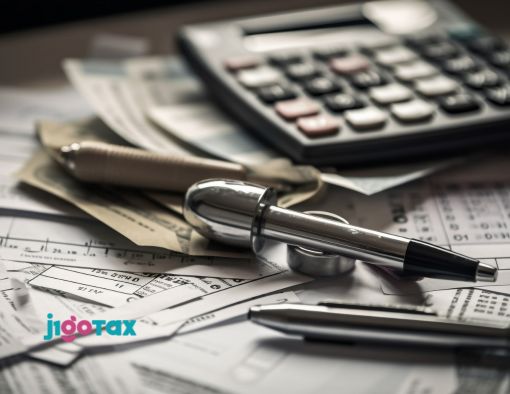DS-2019 Form for J1 Visa Holders – Complete Guide
The DS-2019 Form, officially known as the Certificate of Eligibility for Exchange Visitor Status, is the foundation of every J1 visa journey. Without this document, you cannot apply for a J1 visa or participate in an exchange program in the U.S.
In this guide, we’ll explain everything you need to know about the DS-2019: what it is, why it matters, and how it connects directly to your U.S. taxes as a J1 visa holder.
👉 Before we start, make sure to check out our full step-by-step guide: J1 Visa Taxes: How to file step by step and try our J1 tax calculator to estimate your refund.

The Tax Moves Blog
What is the DS-2019 Form?
-
The DS-2019 is issued by your sponsor organization and contains:
-
Your program category (intern, trainee, student, camp counselor, etc.)
-
Start and end dates of your program
-
Sponsor ID and contact information
-
Estimated financial support
This document proves that you are eligible to participate in the Exchange Visitor Program and is required for your visa application at the U.S. Embassy.
-
Why is the DS-2019 important?
-
Visa Application: You cannot apply for a J1 visa without it.
-
SEVIS Record: It confirms your registration in the Student and Exchange Visitor Information System.
-
Work Authorization: Employers may request it as proof of your J1 status.
-
Tax Filing: During tax season, it confirms your program dates, which determine if you must file Form 1040NR or Form 1040.
DS-2019 and Taxes
Your DS-2019 is part of the essential tax checklist for J1 visa holders. Along with your W-2, 1042-S, and passport, it helps:
-
Confirm how long you stayed in the U.S.
-
Define if you are a nonresident alien or resident alien for tax purposes (check with our Residency Guide).
-
Ensure your tax return (Form 1040NR + Form 8843) is accurate.
📌 Related resources:
Common Problems with DS-2019
- Lost Form – You must request a replacement from your sponsor.
- Incorrect Dates – Wrong dates can affect both your legal stay and your tax return.
- Not Keeping a Copy – Always keep digital and physical copies for tax filing.
How DS-2019 fits into your J1 Tax Journey
- You start with your Passport + DS-2019 when applying for your visa.
- You enter the U.S. and begin your J1 program.
- You work and receive income (usually with a W-2).
- At tax season, your DS-2019 helps confirm your residency status and filing obligations.

FAQ – DS-2019 and Taxes
Do I need DS-2019 to file taxes?
Yes. It confirms program dates and is part of the document checklist.
Can I file taxes without DS-2019?
Not recommended. It can lead to delays or mistakes in your return.
Is DS-2019 the same as SEVIS?
No. DS-2019 is the physical form, SEVIS is the digital system that tracks your record.
Can I use DS-2019 to get an SSN?
Yes, DS-2019 is required alongside your passport and visa when applying for a Social Security Number.
Why J1 Go Tax?
At J1 Go Tax, we specialize exclusively in J1 visa tax returns. Unlike other companies, we only prepare taxes for J1 holders with a W-2, and you don’t pay unless you receive a refund.
👉 Calculate my refund for free
We understand the unique connection between your DS-2019, W-2, and Form 1040NR, making your tax filing simple and accurate.
-
Core Guides & Calculators
1. Learn everything about J1 visa taxes — our complete 2026 step-by-step guide for nonresident workers with W-2 income.
2. Estimate your refund instantly with our J1 visa tax calculator — no signup required.
3. Compare Form 1040 vs 1040NR for J1 visa holders and find out which one applies to you.
4. Understand the importance of your DS-2019 form — it defines your program, tax status, and eligibility.
Forms & Tax Documents
5. Did you receive a 1099 instead of a W-2? Here’s what to do — Form 1099 for J1 visa workers explained.
6. Learn how to apply for your SSN or ITIN as a J1 visa holder before filing your taxes.
7. Understand your IRS transcripts for J1 visa taxes — what they show and how to request them.
8. Received a Form 1042-S? Discover what it means and how to include it in your tax return.
9. Find your Form W-2 for J1 visa — and learn what each box means when you file.
10. File correctly using the official Form 1040NR for J1 visa holders — step-by-step.
11. Don’t forget your Form 8843 — it’s mandatory even if you had no income.
12. Check this J1 visa tax return example using Form 1040NR to understand how everything fits together.
Special Cases & IRS Resources
13. Missed the April deadline? Learn how to file J1 visa taxes after April and still get your refund.
14. Review official IRS guidance on Taxation of J-1 visa holders and resident status.
You may also like
Do J-1 Visa Holders Pay State Taxes? A State-by-State overview
Do J-1 Visa Holders Pay State Taxes?Yes. J-1 visa holders generally must pay federal and state income tax on U.S.-source income. State rules differ: some tax any income earned in the state (nonresident sourcing), some tax residents on worldwide income, and a few states have no personal income tax at…
Substantial Presence Test for J-1 Visa Taxes – 1040NR or 1040 Explained
Substantial Presence Test for J-1 Visa Taxes: Resident vs Nonresident StatusThe Substantial Presence Test J-1 Visa Taxes is the IRS rule that determines whether a J-1 visa holder is classified as a nonresident alien or resident alien for U.S. tax purposes.This classification directly affects which tax form you must file…
J-1 Visa Taxes in Orlando – Guide for W-2 Workers Only
J-1 Visa Taxes in Orlando: What You Should KnowOrlando, Florida, hosts thousands of J-1 exchange visitors with Form W-2 income only, especially through programs connected to theme parks, hospitality, tourism, hotels, restaurants, retail, and cultural exchange organizations across Central Florida. Most employers in Orlando pay J-1 workers through standard W-2…
IRS Announces First Day of 2026 Tax Season – Filing Dates & Tools
IRS Announces First Day of the 2026 Tax SeasonThe Internal Revenue Service (IRS) has officially announced that January 26, 2026 will be the first day of the 2026 tax filing season. Starting on this date, the IRS will begin accepting federal tax returns for the 2025 tax year. This announcement…
J-1 Visa Taxes in South Bay – Guide for W-2 Workers Only
J-1 Visa Taxes in South Bay: What You Should KnowSouth Bay, including areas such as Torrance, Redondo Beach, Manhattan Beach, Hermosa Beach, Hawthorne, and El Segundo, hosts many J-1 exchange visitors with Form W-2 income only. Participants commonly work in hospitality, tourism, aviation, technology support, universities, retail, and service industries…
J-1 Visa Taxes in Long Beach – Guide for W-2 Workers Only
J-1 Visa Taxes in Long Beach: What You Should KnowLong Beach, California, hosts thousands of J-1 exchange visitors with Form W-2 income only, particularly through programs connected to ports and logistics, hospitality, tourism, universities, healthcare facilities, retail, and service industries across Los Angeles County. Most employers in Long Beach pay…
J-1 Visa Taxes Central Valley – W-2 Workers Only
J-1 Visa Taxes in Central Valley: What You Should KnowCalifornia’s Central Valley is home to a large number of J-1 exchange visitors with Form W-2 income only. Each year, non-resident workers are employed across agriculture support services, food processing, logistics, hospitality, education programs, healthcare assistance, and seasonal operations in cities…
J-1 Visa Taxes in Fresno – Guide for W-2 Workers Only
J-1 Visa Taxes in Fresno: What You Should KnowFresno and California’s Central Valley host a significant number of J-1 exchange visitors with Form W-2 income only each year. Participants work mainly in agriculture support services, food processing, hospitality, education programs, healthcare assistance, cultural exchange roles, and seasonal employment across Fresno…
J-1 Visa Taxes in Ventura, CA: What You Should Know
J-1 Visa Taxes in Ventura: What You Should KnowVentura and the surrounding coastal areas host a steady population of J-1 exchange visitors with Form W-2 income only each year. Participants are employed mainly in hospitality, coastal tourism, restaurants, seasonal services, agriculture support roles, cultural exchange programs, and education-related employers across…
J-1 Visa Taxes in Santa Bárbara – Guide for W-2 Workers Only
J-1 Visa Taxes in Santa Bárbara: What You Should KnowSanta Bárbara and the Central Coast welcome thousands of J-1 exchange visitors employed by beach resorts, university programs, seasonal tourism businesses, and healthcare training centers with Form W-2 income only each year. Most employers in Santa Bárbara pay J-1 participants through…










